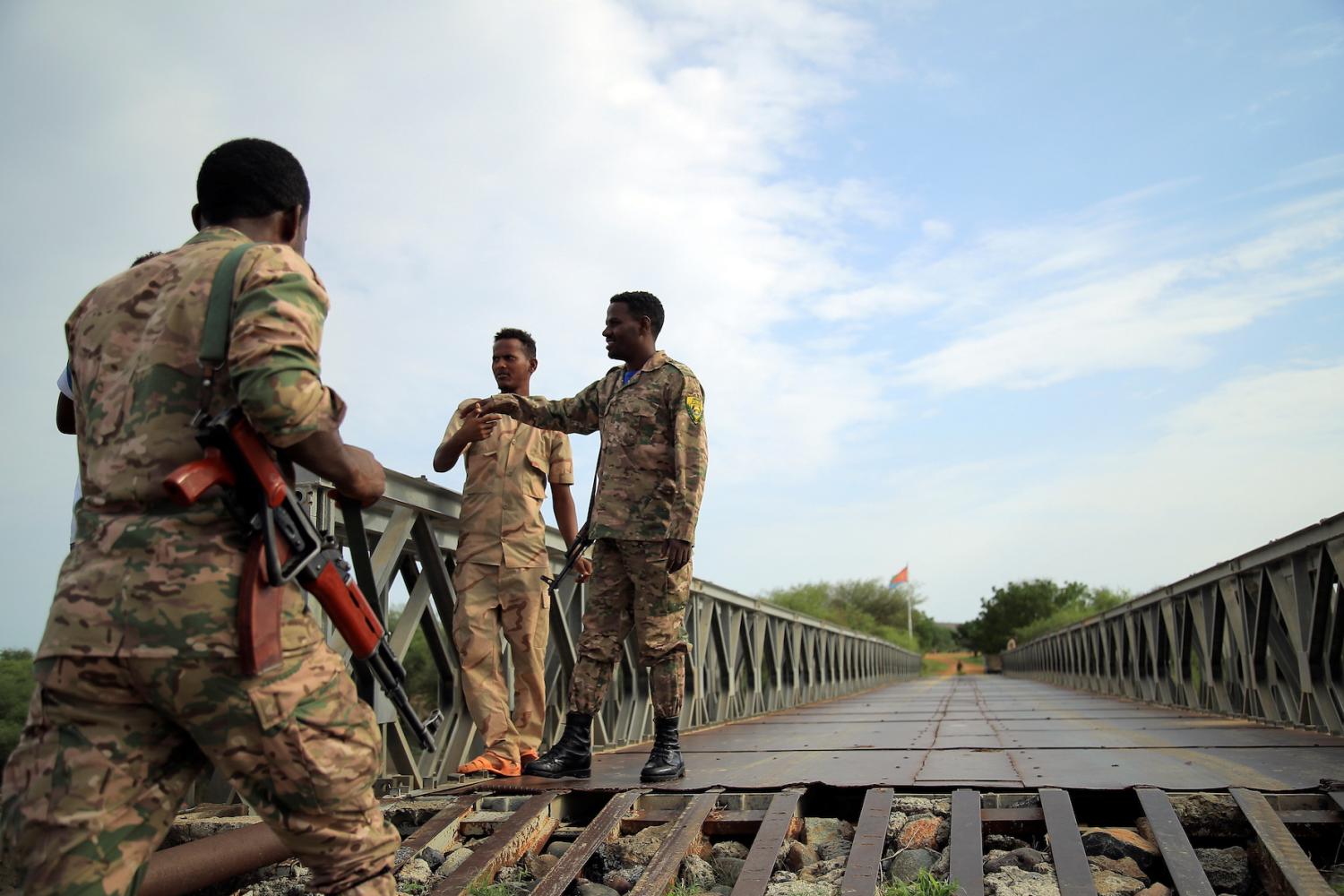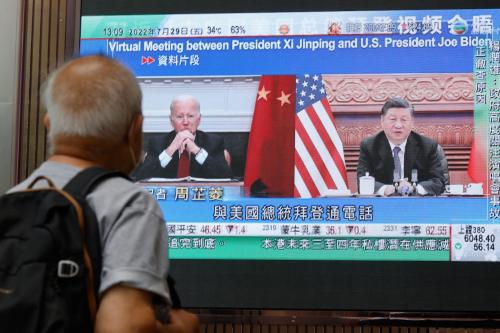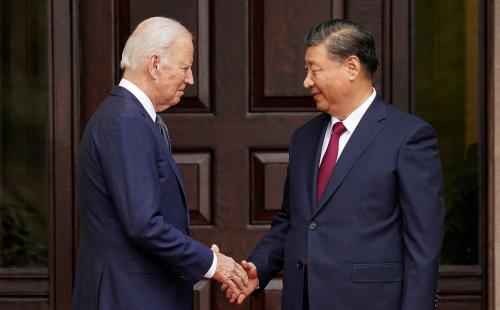This piece is part of a series titled “Nonstate armed actors and illicit economies in 2024” from Brookings’s Initiative on Nonstate Armed Actors.
Between 2016 and 2022, four local Chinese public security bureaus reportedly established 102 overseas police service stations in 53 countries across North and South America, Europe, Africa, and Asia. Citing reports on these stations released by human rights NGO Safeguard Defenders, authorities in the United States, Canada, the United Kingdom, the Netherlands, and 10 other countries all launched investigations into these outposts. Concerns about these overseas police stations were amplified by evidence of China’s foreign interference operations and intimidation of overseas critics.
Are fears of these stations warranted? What are the stations’ origins and operations and their links to transnational repression? In responding to these stations, democratic governments need to confront the broader problem of transnational repression. This will require earning the trust of diaspora communities, training law enforcement, and providing support to victims of Chinese state transnational repression.
China’s official stance: Service centers, not police stations
When asked about these stations, Beijing has either denied their existence or insisted that these “service centers” provided administrative services for overseas Chinese. Foreign Ministry Spokesperson Zhao Lijian asserted that stations were simply places for Chinese citizens “to get their driving licenses renewed and receive physical check-ups for that purpose.” In Beijing’s narrative, these stations perform bureaucratic functions like consulates.
This characterization is partially accurate. At least officially, station staff are local residents, not police. By accessing services at these stations by phone or online reporting platforms, overseas Chinese can renew residency cards, driver’s licenses, and national ID cards. These stations are also not standalone facilities but instead are located in businesses or residential neighborhoods. Others operate out of overseas associations, like the America Changle Association NY in New York City or the Hungary Qingtian Hometown Association in Budapest.
Beijing’s motivations: Controlling the diaspora abroad
Despite Beijing’s protestations, overseas police service stations are part of China’s broader efforts to influence and control the Chinese diaspora. They are part of “a network of party and state agencies responsible for influencing groups outside the party,” known as the united front system. General Secretary Xi Jinping has stressed the importance of united front work, calling it a “magic weapon” for the “Chinese people’s great rejuvenation.” Outside China, Beijing has long used the united front system to “guide, buy, or coerce political influence abroad,” including through overseas Chinese work (qiaowu) aimed at building connections with the Chinese diaspora.
While overseas stations appear to be embedded in the united front system, it is unclear how much direct support the Chinese central government gave these efforts. China’s long-standing “guerilla policy style” is marked by continuous experimentation. In the case of overseas stations, local police may have begun experimenting with new ways of governing the diaspora in response to signals from central authorities about the role of united front work in “guiding overseas Chinese” (yindao huaqiao). According to Suzanne Scoggins, a scholar of China’s policing system, police stations inside China are expected to monitor dissidents and other targets more closely than in the past. It is entirely possible that heightened expectations for police stations domestically also prompted the setup of stations overseas, which can simultaneously conduct bureaucratic work and carry out surveillance and repression of overseas Chinese, as was the case in Manhattan.
Public security bureaus Wenzhou and Nantong set up the first overseas stations in 2016, and Qingtian and Fuzhou established stations in subsequent years. State media indicates that Fuzhou’s public security bureau worked with the Overseas Chinese Affairs Office (which since 2018 has operated under the United Front Work Department) to establish 38 overseas stations. With more than 4.3 million people of Fuzhou ancestry living abroad, Fuzhou’s police may have recognized a unique opportunity to extend its influence beyond China’s borders. Yet despite overseas stations’ purported bureaucratic functions, China law experts like Jerome Cohen have argued that Chinese police who operate without permission overseas are illegally infringing upon foreign states’ sovereignty.
Security concerns and responses by democratic governments
What makes these service stations particularly concerning is their connections to Chinese state transnational repression. Beijing has a well-documented history of harassing and intimidating overseas Chinese citizens and diaspora members. Those that China targets domestically are also pursued abroad, including activists, human rights lawyers, protesters, Uyghurs, Tibetans, and students, among others. Through intimidation and harassment, the Chinese government violates targeted individuals’ rights and freedoms while challenging democratic states’ sovereignty.
Many countries are concerned about the role these stations play in transnational repression. In 2022, a Chinese dissident in the Netherlands reported receiving a call from service station staff demanding his return to China. This and other cases indicate that some stations are involved in “persuasion to return” operations, where police and prosecutors in China convince or threaten suspects overseas into returning to China to face trial, often without the cooperation of host states. A Safeguard Defenders report points to another case where Qingtian prosecutors and police worked with a Madrid station to convince a fugitive in Spain wanted for pollution-related offenses to return to China. The Dutch and Spanish cases suggest that some stations are collaborating with Chinese law enforcement to intimidate overseas Chinese.
Democratic states have responded to these stations with arrests of their personnel, warnings, and investigations. In April 2023, the U.S. Department of Justice charged two men for conspiring to act as Chinese government agents and for obstruction of justice for collaborating with Chinese police to open a station in Manhattan’s Chinatown. One of the men tied to the Manhattan station is alleged to have participated in a persuasion to return operation and helped locate a California-based activist.
Other democracies have called on Beijing to account for these stations. In late 2022, Canada summoned China’s ambassador over “so-called police stations.” Tokyo announced investigations into stations inside Japan. Germany’s 2023 “Strategy on China” identified “overseas police stations” as examples of transnational repression and violations of German sovereignty. Ireland and the Netherlands demanded the closure of stations in their borders. And in a May 2023 communique, the G7 called on Beijing to abide by the Vienna conventions on diplomatic and consular relations, a reference to stations conducting consular business outside diplomatic missions.
More information is needed
Concern over these stations is warranted. However, important information is still lacking. First, it is unclear which stations are involved in transnational repression or persuasion to return operations. In June 2023, the United Kingdom’s Minister for State Security declared the stations “unacceptable” but acknowledged that a police investigation into three U.K.-based stations found no evidence of illegal activity.
Second, it is unclear how many of the 102 stations Safeguard Defenders listed are still operating. In October 2023, a deputy commissioner for the Australian Federal Police stated that police had found “no information that indicates that a Chinese police station is operating in Sydney.” And while in December 2022 the Netherlands’ foreign minister reported that the government took “immediate steps” to close stations inside the country, a February 2023 report suggested that Amsterdam police found no physical location for one of the stations. According to the Chinese government, many stations have already closed and their services moved online “in light of the evolving COVID situation.”
Information from station staff is also limited. It is not always clear who heads these stations, if staff are paid, and how involved staff are in police work. People connected to stations in Toronto, Seoul, and London have all denied involvement in overseas police activities. And in Montreal, two groups tied to stations have sued the Royal Canadian Mounted Police in response to funding cuts and job losses the groups claim resulted from police investigations.
What to expect in 2024 and how to respond
Despite limited information, it is clear that these stations are part of Beijing’s extensive efforts to influence and control the Chinese diaspora. For overseas activists who face the threat of Chinese state transnational repression, service stations are sharp reminders of the Chinese authoritarian state’s global reach.
However, closing these stations is not enough. Beijing and its proxies have long harassed international students, refugees, and activists well before service stations were established. Much of transnational repression takes place unconnected to service stations. Even when the last service station is closed, Beijing will continue to target Chinese and non-Chinese citizens in democracies around the world.
One tool to combat foreign interference is legal instruments like foreign agent registries that require people to disclose their work on behalf of foreign principals. Canada is in the process of creating such a registry, similar to the United States’ Foreign Agents Registration Act and Australia’s Foreign Influence Transparency Scheme. Foreign agent registries, in principle, target malign foreign interference. But to work, registries need oversight, proper funding, and competent staff who can identify foreign interference without contributing to racial profiling. While registries are a necessary response to the problem of Chinese state foreign interference, registries alone are not enough.
What is needed are multi-faceted, evidenced-based policy responses. Governments must earn the trust of victims of Chinese state intimidation, whose reports they have often ignored. This will require training law enforcement, immigration authorities, and intelligence agencies to recognize and respond to the threat of transnational repression, including its digital forms. Governments should also work with community stakeholders to provide support to victims, including information on how to document cases of transnational repression. These measures will not only help victims but also demonstrate democratic states’ resolve in the face of Beijing’s campaigns of foreign interference and transnational repression.
The Brookings Institution is committed to quality, independence, and impact.
We are supported by a diverse array of funders. In line with our values and policies, each Brookings publication represents the sole views of its author(s).










Commentary
China’s overseas police stations: An imminent security threat?
February 16, 2024